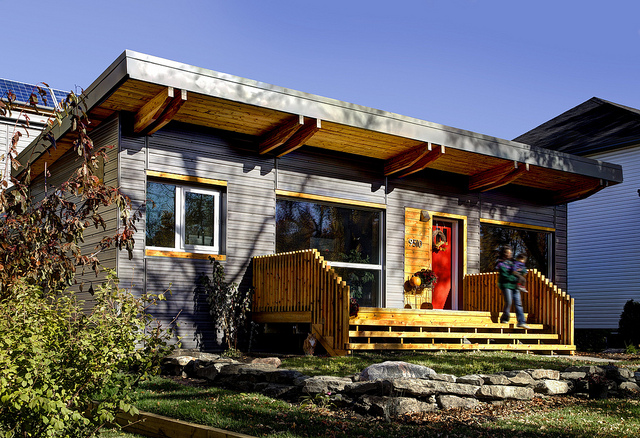
Housing Europe, the European Federation for Public, Cooperative and Social Housing and its members joined two EU funded projects – called Heart and Triple A Reno to demonstrate how technological innovation should follow social and human needs instead of the other way around. They want to put people at the centre using EU funds and involving them more closely in tackling today’s housing challenges.
One of these challenges is the improvement of the energy performance of the buildings. This is not only about developing new technologies and materials in the construction of buildings, their systems and ICT. For social housing providers, it is also about ensuring that these solutions are affordable for all, comfortable and, above all, healthy and safe for their residents.
The HEART project started in October 2017 and aims to develop and test interconnected systems for the deep renovation of residential buildings. HEART gathers 16 partners from 10 different countries and from different fields (ICT, manufacturing, technological institutions, federations, social housing organizations, etc.). It wants to tackle the technical, economic and social aspects of energy retrofits by developing a toolkit based on the interaction between building, technologies, technical systems and the residents.
This ‘HEART toolkit’ will integrate different subcomponents – envelope technologies, HVAC (Heating, Ventilation, and Air Conditioning), RES (Renewable Energy Systems) and BEMS (Building Energy Management Systems) – and offer high levels of performance by making them communicate with each other. This will enable the conversion of ordinary buildings into Smart Buildings, i.e. in interactive buildings characterized by dynamic and multidirectional flows of energy and information.
At the centre of the project are two apartment buildings managed by social housing providers. One is managed by Est Metropole Habitat with activities nearby Lyon in France and the other one is from ACER and situated around Regio Emilia in Italy. After the HEART interventions, the buildings will be in line with nearly Zero Energy targets (<50 kWh/m2/yr) and should achieve energy savings of 90%.
Both case studies where specifically selected on the basis of their high representativeness with regards to the whole target application context: medium size, multi-storey condominium buildings. These are typical buildings from the second half of the 20th century located in the European areas with a moderate climate. It is estimated that there are around 1,005,000 such buildings in Europe.
Housing Europe will participate in various stages. It will be leading activities to ensure that the measures and technological innovations contribute to the residents’ satisfaction and acceptance of such renovation projects. Housing Europe will also be involved in analysing the end-users behaviours in order to assess the proper interaction with the new systems.
Securing Triple-A Renovation
Housing Europe and its Italian member Federcasa are also involved in another Horizon 2020 project called TripleA-Reno. It puts people at the heart of energy efficiency goals by recognizing that we need to know more about end-users’ motivations and influences, their behaviour and habits, in relation to energy use and their acceptance for deep renovation projects.
To make nZE (nearly Zero Energy) renovations attractive for consumers and end-users TripleA-Rreno wants to come up with clear and meaningful information and communication on the real, proven performances of energy usage, indoor air quality and personal health.
This will be done in an ingenuous way: by developing an open and end-user-centred gamified (application of game-design elements and game principles) platform for decision support, quality validation / proven quality and community building. This will be used during the design-phase of the renovation, the construction-phase and the in-use-phase.
The game engine will be tailored to the requirements and needs of people living in different buildings with different social, cultural, historical, and economic backgrounds. The findings will enable to understand behaviour and habits of people from various perspectives and in different settings and will identify the motivation practices from a “bottom-up” perspective.
This gamified approach will be tested in seven demonstration cases including condominiums, with social housing, located in Greece, Spain, Italy, Slovenia, The Netherlands, Romania and Hungary.
Housing Europe will disseminate the results among its 45 national and regional members. It will organize several meetings to promote the platform and get feedback from its members on the results of the TripleA-rReno approach.
By Sébastien Garnier, Housing Europe | Published in Energy, Research
Featured Image by Garth Crump (CC BY-NC-SA 2.0)

